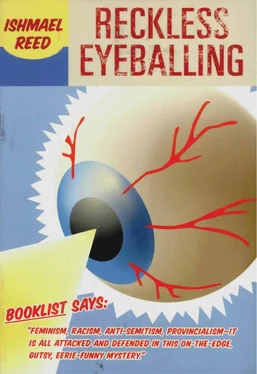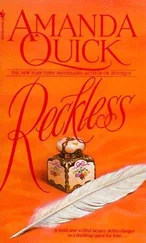The second act took place inside the courtroom and was highlighted by Ham Hill’s attorney demolishing the testimony of Cora Mae. She showed the jury photos of Cora as she appeared twenty years before, in the sixties, with heavy makeup, miniskirt, eye shadow, rouge, blond hair with black roots: a sleaze and a tease. Over the objection of Cora’s defense lawyer, Ham Hill’s attorney said that there was no difference between Cora Mae and the man who opens his coat and displays his genitals to females in public places. Her description of Cora Mae as a flasher brought an eruption of discussion from the courtroom, whereupon the judge banged the gavel for order. Cora Mae, the defense attorney claimed, craved attention from men and only complained about Ham Hill when she noticed that Ham Hill wasn’t staring at her in the fateful encounter outside the supermarket where Ham Hill worked as a packer. At that moment the skeleton, with a sardonic grin, began to slide to the floor; the bailiff propped it up. This gesture by the corpse, as if done to make a point, was applauded wildly by the audience. The judge overruled the objections of Cora Mae’s lawyer, stating that Ms. Mae’s reputation in the sixties was certainly relevant to the case. The second act ended with Cora Mae’s lover — both of them were dressed in men’s clothes and looked as though they’d just climbed from beneath a manhole — jumping to her feet and complaining about Cora’s treatment and the judge citing the woman for contempt and ejecting her from the courtroom. It took five strong women to accomplish this deed.
During the intermission Ball went out into the lobby. Average everyday normal middle-class people were congratulating him and parting him on the back, while the white feminists stared at him stonily. He could tell that their black feminist friends had really enjoyed the performance of Ham Hill’s defense attorney but wouldn’t let on before their white sisters; one came up to him later and told him so. The fellas had said that a lot of feminists were okay when you had a one-on-one relationship with them, but when they were around the sisters they’d get all fired up. The academic black Marxist-Leninists were in one corner sneering, and the black avant-garde members of the audience segregated themselves from the rest of the people in the lobby. They were standing near the wall, sulking.
Drat them, Ball thought. He figured that he had it made. The third act would begin with Cora Mae back on the stand. Under questioning, Cora Mae would reveal that it took her twenty years to bring charges against Ham Hill, the lynch mob victim, because she’d been converted from a rock and roll sex kitten to a radical feminist and was only now capable of assessing the heinousness of Ham Hill’s crime. That she felt it was important to clear her name. That if there was no trial, there’d always be the suspicion that she was trying to lure Ham Hill, the supermarket packer, who’d been lynched by her husband and his friends. That sex with her husband was no good after the incident and that he’d spent many nights during their married life pacing the floor and sitting on the porch, staring at the stars. She would testify that her social life had been ruined until she took up with her lover and opened the radical lesbian bookstore. The audience would hiss and catcall at this explanation, Ball was sure. Confident, Ball decided to leave the workshop performance of his play and head upstairs to the Lord Mountbatten, where “the important play” was taking place. As he walked up the aisle well-wishers touched his elbows or shook his hands.
They had the Lord Mountbatten set up like a German cabaret of the 1930s. The audience was seated at tables, and was being served liquor and sandwiches. The actress playing Eva Braun sat on a dressing room bench before a large mirror. It was supposed to be her bedroom inside the Führerbunker. She was adjusting a bridal headdress and powdering her face. She wore a frilly pink slip and was speaking her lines to the audience through the mirror. A tiny orchestra of tuba, trombone, two violins, saxophone, bass, and drums was positioned behind the mirror. On one flat board that represented the bedroom’s wall was a photo of Klara Hitler, Hitler’s mother, who looked like the dictator. Ms. Braun must have just made some kind of pungent point because as Ball entered, the audience of mostly women was applauding loudly. He sat down at one of the tables and the two women who were occupying the other chairs frowned. During the scene the sound person had simulated the noise of airplanes and bombing taking place in the background.
“Now he’s going to marry me. Now that the enemy is closing in, he wants to tie the knot. Well, I have news for him.” (The audience applauds wildly and Becky French, seated with her party of feminist celebrities at the front table, beams out over the audience. She notices Ball. Ball waves at her, but she ignores him.) “All these nights he kept me locked up in this Romanesque cemetery with its stone walls and security guards while he was gallivanting all over Europe. I knew what he was doing. Don’t think that I’m not aware of the other women. All of them, Goebbels, Göring with his big bovine bitch of a wife, and his cream-colored uniforms. Don’t think that little Eva doesn’t know what’s going on.”
(Audience applauds madly.)
“As for Der Führer, as he calls himself, he nearly screwed his little niece Geli to death because he couldn’t deal with an older, more mature woman. They said that Geli committed suicide, but I know. He killed her because she got pregnant by a Jew. A woman that would come between him and Klara, his mother. Look at that bitch.” (She points to the photo of Klara Hitler hanging on the wall.) “Boy, was she a nudge.” She walks up and down the floor with her hands on her hips, occasionally making sweeping gestures with one hand. She’s constantly smoking a cigarette. “‘Adolf, why do you want to go to Vienna to study art? Adolf, why don’t you try to settle into a legitimate business?’‘Yes, mama.’ Boy, was he devoted to her. Even spared the Jewish doctor who took care of her. As for his thing about the Jews — well, everybody knows why he does that. They talk about him behind his back. Those insane speeches he makes when he’s had all of that cocaine and heroin. The Jewish problem. The only Jewish problem Germany has is him.” (Applause.) “God, that woman has been dead these many years, but she still controls him. Sometimes when he’s making love to me, if you want to call it that, he calls out her name. Klara. Oh, Klara. It’s disgusting. And if you knew what I know about him in bed, then you’d understand why he’s trying to conquer all of these countries and be such a big man.” (The actor playing Hitler emerges from where he’s been seated in the audience and joins Eva, the spotlight following him. There’s a chorus of boos from the women in the audience. The trombone makes a clownish sound, and there’s a clash of cymbals from the drummer.) “Eva. Eva. The allies are bickering among themselves, according to the shortwave. There’s hope yet. Are you ready? The preacher will be here soon.” (He rushes back into the audience, the spotlight following him. Eva turns to the audience.) “That’s that cocaine and heroin talking. There’s no way he’s going to get out of this place alive. That’s his problem,” she says, lighting a cigarette. (A black woman in the audience says, “Tell it, honey.” Other women join in. “Tell it, honey,” followed by titters. The two women at Ball’s table smile at him. He turns his eyes away.) “Well, I’m not going to be like those other women.” (Wild applause.) “Eva’s got some sense.” (More applause. Hitler emerges from the audience again, this time with a priest in priestly garb carrying a Bible.)0
Читать дальше












